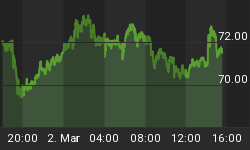Late-night shopping in London's greasy West End is never much fun, especially at Christmas. But for a brief moment last week, the hard slog almost seemed worth it.
I found a cardigan. Trouble was, it cost more than one ounce of gold.
It looked perfectly ordinary - chunky knit, good-quality wool, available in a range of muted colors. Hey, maybe there was a chance my wife would like it! So maybe, this Christmas, she wouldn't swap her gift for a refund just as soon as the shops opened again on Dec. 26.
But looks were deceiving, and this must have been no ordinary cardigan. For there was the price-tag. It said the cardigan cost £365. That's US$715 at today's exchange rate...!
Did gold thread show in the detail? Did chinchilla fur line the pockets? The label said nothing about cutting fuel bills for a family of four either. So you might wonder, as I did...dumbstruck in Selfridge's...in whose world a wool cardigan could possibly be worth so much money.
But that is the world we all happen to live in today it would seem, a place where value and worth have become total strangers. And if my wife takes the present I buy her straight back to the shops after Christmas, I'll be blaming the bubble in cheap money. No way was I swapping an ounce of gold for a cardigan.
"Cheap money is popularly supposed be an unalloyed good thing," as Martin Hutchinson writes for PrudentBear.com, "allowing people to borrow money for home mortgages more easily, encouraging business expansion and giving Third World countries access to capital they would otherwise be denied. Like many popular superstitions, this one is largely the opposite of the truth."
The real truth about cheap money has been plain for more than 250 years. Richard Cantillon - "the father of modern economics and one of history's great traders," as Sean Corrigan reminds us at SafeHaven.com - first spotted that the process of creating new money can never be neutral. "Somebody, somewhere has to have the new money first," Corrigan notes, and that lucky soul gets more spending power than his efforts deserve. It's a windfall, pure and simple. And when our man spends his good fortune, he then dilutes the value of money held by everyone else, stealing a piece of their purchasing power and making them poorer.
"Governments are often tempted to answer the cry for more purchasing power by simply creating more money," writes a central banker of all people. "But in so doing, the opposite effect is achieved - the purchasing power of money is actually reduced.
"The result," continues Jerry L.Jordan in the Federal Reserve Bank of St.Louis Review, "is inflation: a rise in the number of dollars required to purchase a given standard of living." Put another way, a perfectly ordinary cardigan that I'd like to buy my wife as a present now costs $715.
Okay, you could argue that the gift is out of my price bracket - and it is. That's not to say it is worth $715 of anyone's cash. And remember, this was a plain woolen cardigan, hardly extravagant. It was just a cardigan that my wife might have liked. But that humble aspiration is now beyond my standard of living.
The mischief wrought by cheap money doesn't just fill the clothes shops this Christmas. Its dirty finger-prints were all over Friday's edition of the Financial Times, too. The stock market pages proved that M&A deals and M&A rumors are all investors need to worry about at the moment. Forget "value" or skillful management; the chance that an investment banker might persuade one company to buy another is all that matters.
Flick to page 22, and the FT announced the arrival of the world's largest listed hedge fund. Page 24 told us about "bought deals" in London's AIM market...in which underwriters simply give money to a company when it floats its shares...and then goes in search of investors to buy the new shares. Page 41 explained that the South Korean stock market now leads the world in the volume of equity derivative trades each day.
Just to the right of this story was a report on €1.7bn worth of "payment in kind" notes issued by a private Italian telecoms firm. They don't pay a cash coupon, but simply give bondholders more bonds instead. The FT calls PIK notes "ultra high risk". Yet investors "clamored" to buy them. And there, at the back of the newspaper, came news of Morgan Stanley's latest cheap money wheeze.
This week Morgan Stanley took out a loan worth $360m, borrowed in Japanese Yen. These "ninja loans" as they're known follow "samurai bonds" in milking Japan's ultra-easy monetary policy for cheap cash to invest elsewhere in the world - thus raising the prices of all things, including wool cardigans. "Bankers say ninjas could get a boost in January," reports the FT, "when for the first time syndicated loans involving parties in the US, UK and Japan will not be liable for withholding tax, potentially creating a huge unified market."
No wonder then who's getting first dibs on today's flood of new money. In the City of London this Christmas, total bonus payments will hit £8.8bn according to the BBC. Dr.Marc Faber said in a recent interview that Wall Street will give $36bn in bonuses to its traders, dealers and deal-makers this year. In other words, the money-shufflers are also creaming all the advantage that inflation can give.
The rest of us are stuck trying to find Christmas gifts our loved-ones might like...at prices we're willing to pay.
















